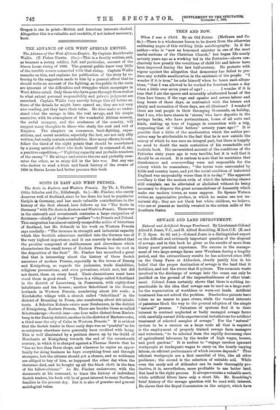SCOTS IN EAST AND WEST PRUSSIA.
The Scots in Eastern and Western Prussia. By Th. A. Fischer. (Otto Schulze and Co., Edinburgh. 6s.)—Mr. Fischer, who surely deserves well of Scotland, since he has done his best to popularise Carlyle in Germany, and has made valuable contributions to the history of the Scot abroad, here follows up his "The Scots in Germany" with The Scots in Eastern and Western Prussia. There was in the sixteenth and seventeenth centuries a large emigration of Scotsmen—chiefly of traders or " pedlars "—to Prussia and Poland. This emigration has almost entirely escaped the notice of historians of Scotland, but Mr. Schmidt in his work on Western Prussia says cordia.11y • "The increase in strength and industrial capacity which this Scottish admixture instilled into the German was of the very highest importance, and it can scarcely be doubted that the peculiar compound of stubbornness and shrewdness which characterises the small towns of Eastern Prussia has its root in the disposition of the Scot." Mr. Fischer has unearthed a great deal that is interesting about the history of these Scotch ancestors of modern Prussia, especially in the towns of Danzig and Konigsberg, as regards the jealousies, trade disabilities, religious persecutions, and even privations, which met, but did not -daunt, them on every hand. Their clannishness must have stood them in good stead. "There is a village called Schottland in the district of Lauenburg, in Pomerania, with eighty-four inhabitants and ten houses ; another Schottland in the Danzig lowlands in Western Prussia, numbering about 200 souls ; a Kirchdorfer village with a church called 'Schottland' in the district of Brumling in Posen, also numbering about 200 inhabi- tants. A Schotten Kolonie exists near Neuhausen, in the district of Konigsberg, Eastern Prussia. There are besides three so-called Schottenkrlige—Scotch inns—one four miles distant from Marten- burg in the Danzig district, another in the district of Marienwerder, a third near the city of Culm in Western Prussia." It is evident that the Scotch trader in these early days was as "pushful" as his countrymen elsewhere have generally been credited with being. This is well illustrated by a petition drawn up by the Guild of Merchants at KOnigsberg towards the end of the seventeenth century, in which it is charged against a Thomas Hervie that he " has no less than ihree shops, and wherever he espies an oppor- tunity for doing business he buys everything from and through strangers, lest the citizens should get a chance, and so noblemen are obliged to buy of him, as happened the other day when the Governor died, and he bought up all the black cloth in the face of his fellow-citizens." As Mr. Fischer endeavours, with the documents at his command, to trace the history of individual Scotch traders, his book will be of great interest to many Northern families in the present day. But it is also of genuine and general sociological value.






























































 Previous page
Previous page